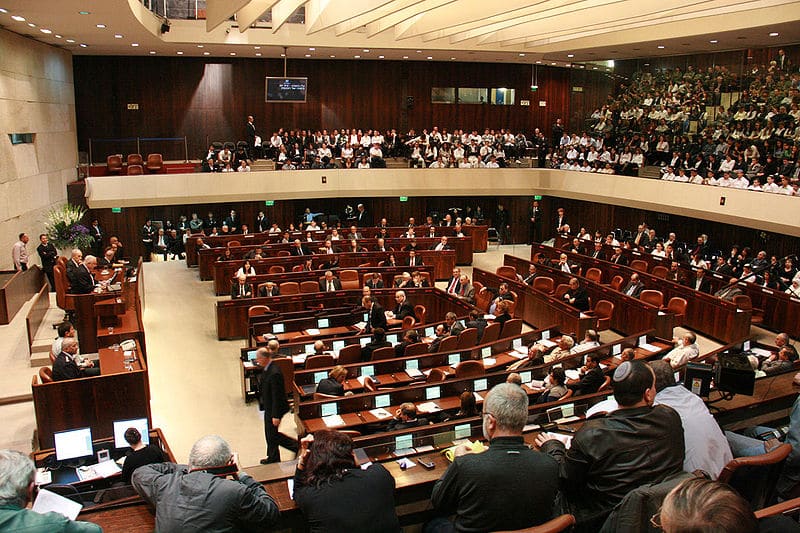The highly-anticipated vote to elect the Knesset’s representatives on Israel’s Judicial Selection Committee, originally scheduled for Wednesday morning, is likely to be delayed by a month, casting a shadow over the ongoing judicial reform negotiations at the President’s Residence.
In a last-ditch effort to resolve the contentious political impasse, Prime Minister Benjamin Netanyahu convened leaders of the coalition parties. However, a halt in the negotiations may plunge Israel back into the tumultuous state witnessed earlier this year when the coalition endeavoured to unilaterally push through its reforms.
According to the Knesset’s protocol, a vote is deferred by a month if, with only two candidates contesting for the Knesset’s two seats on the Committee, one fails to secure more affirmative votes than negative. In a tactical move, Netanyahu opted for this clause as he could not guarantee that Yesh Atid MK Karin Elharrar, the sole candidate from the opposition, would clinch one of the seats.
The Judicial Selection Committee, a nine-member body, is tasked with the appointment of judges across all tiers of Israel’s civil court system. The Committee comprises three High Court justices including the chief justice, two ministers one of whom is the justice minister, two Knesset members, and two representatives from the Israel Bar Association (IBA). Additionally, a minimum of one woman must be among the judges, ministers, MKs, and IBA representatives.
The composition of the Committee is a key point of contention in the government’s judicial reform agenda. Supporters of the reforms, led by Justice Minister Yariv Levin, contend that the Bar Association members may be biased towards the judges they frequently encounter in court. This, according to them, grants judges an undue majority, enabling them to handpick candidates of their choice. Levin advocates for a coalition majority in the Committee, which he argues would reflect the public’s mandate in selecting the nation’s judges.
The opposition, on the other hand, warns that providing the coalition with unrestrained control over judicial appointments could lead to judges being selected based on political affiliations rather than expertise or competence.
Traditionally, the coalition reserves one seat for itself and allows the opposition to occupy the second. However, the delay in the vote could severely hamper the process of appointing new judges, notwithstanding the numerous vacancies awaiting fulfilment.
Opposition leaders, Yesh Atid chairman MK Yair Lapid and National Unity MK Benny Gantz, have consistently voiced their intentions to abandon the negotiations if Elharrar is not elected to the Committee. The National Unity party, responding to Netanyahu’s manoeuvre, proclaimed that any political shenanigans surrounding the Judicial Selection Committee would be detrimental to Israel and its citizenry.
Furthermore, the outcome of the Judicial Selection Committee vote holds implications beyond the immediate negotiations. For instance, it could significantly impact Levin’s long-term influence and potentially precipitate his resignation.
The eventual composition of the Committee could also affect the selection of the next Chief Justice as current Chief Justice Esther Hayut is set to retire in October. Traditionally, the Supreme Court justices have adhered to the “Seniority Method,” nominating the most senior judge for the position. The frontrunner, in this case, is liberal judge Yitzhak Amit.
However, Levin might secure substantial control over the Committee if he succeeds in electing the next Chief Justice. If former IBA head Efi Naveh, who is vying to lead the association and is viewed as closer to Levin, triumphs in the election, he might align with Levin, ensuring a 5-4 majority that could favour the appointment of a more amenable chief justice.
This complex scenario is further complicated by the position of Netanyahu’s coalition members. While Netanyahu reportedly favoured Elharrar’s election to bolster the likelihood of at least a partial agreement, significant sections of his coalition, including members from the Likud, perceive conceding a seat on the Committee as an unwarranted compromise with an opposition that hasn’t reciprocated with tangible commitments.
As the situation unfolds, all eyes are on Israel’s political leaders who must navigate this delicate predicament with caution and prudence, bearing in mind the wider implications for the nation’s judicial system and democratic principles.



















